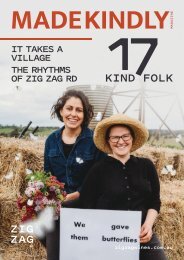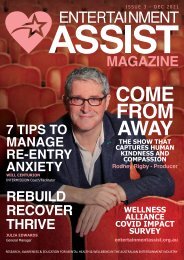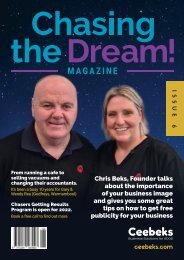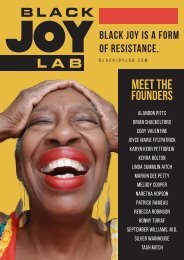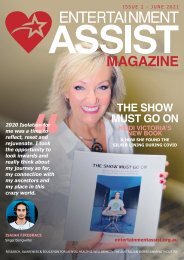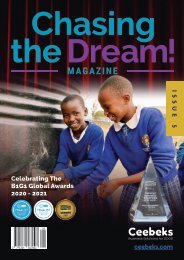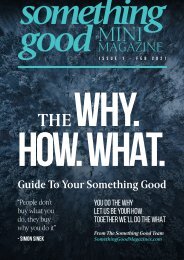Gift Global Magazine - Issue 1
Welcome to Issue 1 - Giftglobal magazine from founder, Sam Beard. Subscribe for free at giftglobal.org/magazine. What is it like to sit across the table from someone who may have been perpetrators or victims of crimes against humanity? Believe it or not, former Amnesty International negotiator Richard Reoch tells us that nothing will be accomplished if we don’t have an open mind free of prejudice and assumptions. According to Bob Rotella, legendary sports psychologist, the process of truly being at peak performance at a dramatic moment is the same for a stellar athlete on the cusp of a championship or for the rest of us regular people who have to act quickly in a decisive decision. Too often, there is no time to think. But it is simpler than we think to get out of own way and clear the rails.
Welcome to Issue 1 - Giftglobal magazine from founder, Sam Beard.
Subscribe for free at giftglobal.org/magazine.
What is it like to sit across the table from someone who may have been perpetrators or victims of crimes against humanity? Believe it or not, former Amnesty International negotiator Richard Reoch tells us that nothing will be accomplished if we don’t have an open mind free of prejudice and assumptions.
According to Bob Rotella, legendary sports psychologist, the process of truly being at peak performance at a dramatic moment is the same for a stellar athlete on the cusp of a championship or for the rest of us regular people who have to act quickly in a decisive decision. Too often, there is no time to think. But it is simpler than we think to get out of own way and clear the rails.
Create successful ePaper yourself
Turn your PDF publications into a flip-book with our unique Google optimized e-Paper software.
Richard Reoch with Senior monks and<br />
police during the war in Sri Lanka<br />
appearances seemed to be the very<br />
emblem of the crime of torture,<br />
turned out to be, in my long years<br />
of experience, one of the most<br />
determined fighters against torture<br />
I have met.<br />
weight of responsibility as a Buddhist,<br />
looking into the eyes of people who<br />
have experienced unspeakable horror<br />
at the hands of people who claim to be<br />
defending Buddhism.<br />
Once I met an army commander who was in charge<br />
of units that were accused of torture. It was my job<br />
to open a discussion with him. In my experience,<br />
what is absolutely essential is to enter into any<br />
such dialogue with a spirit of inquiry. Doing so is the<br />
most valuable use of that time together. The chance<br />
of convincing a person to change their beliefs and<br />
behaviors in one conversation is quite minimal.<br />
Rather, the great gift to come out of the conversation<br />
is to find out why the other person sees the world<br />
in such a radically different way. Sometimes, the<br />
result of that spirit of inquiry produces surprising<br />
results.<br />
I opened the conversation with the commander<br />
from a place of honesty and inquiry. What I soon<br />
discovered was that rather than being defensive<br />
or hostile to me, he revealed something entirely<br />
different. He explained in great depth the efforts he<br />
was making to prevent torture under his command,<br />
most notably by cooperating with the International<br />
Red Cross to identify very specific incidents so he<br />
could deal with the officers who were carrying out<br />
torture. He also indicated to me that if he faced lack<br />
of cooperation from them, he would close those<br />
interrogation centers down.<br />
I knew that he was not fooling me, and I was able to<br />
verify everything that he said. I also knew that he<br />
faced political pressure and required considerable<br />
courage to act the way he did. In fact, in the course<br />
of this conversation, the person, who from outward<br />
I have learned things that I could<br />
never have imagined. I have met<br />
Buddhist monks who have publicly<br />
been in favor of war. In order to<br />
understand them, I have spent long<br />
periods of time in their temples, not<br />
endeavoring to argue with them but<br />
simply to become familiar with them.<br />
Through this patient relationshipbuilding,<br />
I found that their public<br />
posture was sometimes very<br />
different to their private agonies.<br />
So, I think this principle about<br />
actively being willing to inquire<br />
and listen to others – especially<br />
those who are different from us or<br />
with whom we disagree -- has for<br />
me been extremely productive in<br />
terms of opening up dialogue and<br />
contemplating profound questions.<br />
Recently, I was in the living hell of<br />
refugee camps on the border of<br />
Myanmar and Bangladesh to see<br />
the Rohingya people who are the<br />
victims of Buddhist terror. They<br />
were certainly surprised to see an<br />
old white man who looked them in<br />
the eye and said, “I am a Buddhist,<br />
and I have<br />
come here to express my horror and<br />
my sorrow at what has been done in<br />
the name of Buddhism, and which is<br />
utterly the opposite of the Buddhist<br />
teachings.”<br />
People have questioned what the<br />
good people of Germany were doing<br />
during the Holocaust, or what the<br />
good people of Spain were doing<br />
during the Spanish Inquisition, or<br />
what moderate Muslims have been<br />
doing in the face of the rise of Isis. In<br />
these refugee camps, I found myself<br />
facing that same question. I felt the<br />
That is why I believe that, while<br />
there is no guarantee of success,<br />
we cannot afford not to make this<br />
experiment.<br />
Follow RichardReoch.info<br />
Encouragingly, I have found that<br />
mindfulness can build bridges across<br />
differences that seem to separate us<br />
from our common humanity. Over the<br />
last four years, I have been spending<br />
part of my time teaching at a university<br />
in Morocco. It began as a project to<br />
teach mindfulness to young imams<br />
who had completed their primary<br />
Islamic education and were due to<br />
become the equivalent of priests in<br />
their communities. I wondered if it<br />
would be possible to really bridge the<br />
cultural and conceptual barriers that<br />
have come up over so many centuries<br />
of misunderstanding and conflict. But<br />
what I found was that the presentation<br />
of contemporary neuroscience<br />
combined with the direct experience<br />
of pure mindfulness practice crossed<br />
all barriers. The first comment that<br />
these young imams made to me after<br />
their first practice session was “this<br />
will help our prayer.” I realized in that<br />
moment that mindfulness practice is<br />
in a way the purest expression of our<br />
common humanity. It is something that<br />
transcends cultures and history. It is in<br />
a sense an expression of our essential<br />
nakedness in the cosmos.<br />
That deeply personal experience<br />
is the basis of profound listening.<br />
There is understandable skepticism<br />
about whether the ancient traditions<br />
of mindfulness practice can be made<br />
publicly available on a mass scale<br />
and still have the same potency. But<br />
if there was ever a point in history<br />
where as many people as possible could<br />
benefit from that personal experience<br />
of mindfulness (and the resulting<br />
interpersonal experience), it is now.<br />
6 | giftglobal.org<br />
giftglobal.org | 7




